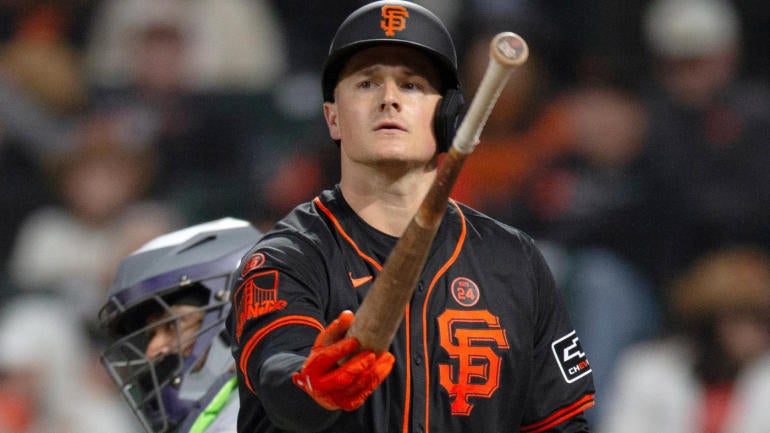Fantasy Baseball: The trade deadline is approaching in your league too, so here are some tips and guidelines
If you want to pull of a trade in 2024, you might actually have to talk to someone

A year ago, I wrote about how nobody enjoys trading anymore. What was once one of the game's main attractions had become overly difficult and rarely worth the effort, as many longtime Fantasy Baseballers could attest.
But trading is still a useful mechanism and can still be satisfying when it's done well. It also happens to be top of mind for everyone this time of year, so it's only natural that you'd want to explore it again. After all, the arrival of the MLB trade deadline likely means your own league's is just around the corner.
So instead of fixating on the problem, I'm going to offer some solutions by sharing my guidelines for negotiating trades. They're less hard-and-fast rules than behaviors that seem to yield the best results, and I should note that I've learned them mostly through experience. As attitudes toward trading have changed, so too has my approach, with one critical lesson being that engagement is now half the battle.
Let's use that as our jumping-off point.
Make sure you have their attention
Sure, you could send an offer directly through the league platform, and maybe the other person will notice it. Maybe. But he's receiving that message amid a sea of distractions within that little device in his hands.
Think about what actually happens when you send someone an offer that way. If you're lucky, an automated message goes to his inbox, but it may well go to his spam folder. Even if it winds up in a place he's liable to see it, the subject line won't reveal the specifics of the deal, and even if he's proactive enough to click on it, he then has to take an additional two steps to respond. Before he gets around to it, he's moved on to the next distraction, and all the while, you've been shut out of his entire thought process (which was probably next to nothing, let's be honest).
It may strike you as inconsiderate but think of all the times you've reacted to someone else's offer the same way. You may have seen it -- may have simply wanted to think about it, just not right now -- but then you went about your day and forgot all about it. Even with the best intentions, it's so easy to let it slip through the cracks.
You know what's not so easy to let slip through the cracks? An actual human connection. While an automated email may be convenient, it's also cold and sterile, the sort of boilerplate nonsense that clutters our inboxes every day (which, incidentally, is why it so often goes to the spam folder). What would be better is a message with an actual soul behind it. An email could work. A text would be even better. It may seem intrusive, but come on, we all get texts every day from dentist offices and whatever else. Getting one from someone we know, in reference to an activity we actually enjoy, would be a welcome change of pace.
Whatever communication method is most likely to promote engagement is the one you want to use because, again, engagement is half the battle. Ideally, you'd initiate the trade with that text because circling back after letting an offer sit for a while could signal desperation.
Get a healthy back-and-forth going
Even if you play in a league with the most attentive, Johnny-on-the-spot trade responders in history, you should still seek engagement beyond just an accept or reject button. The odds of some stab-in-the-dark proposal actually being agreeable to both sides is fairly small, making it a path to repeated rejection. It's true that the opposing party could counter with something, taking cues from you offer, but even that's mostly a stab in the dark. The countering could theoretically continue, each time shedding a little more light on where the other person stands, but realistically, you get one stab, maybe two, before the whole thing loses momentum, possibly with some animosity building along the way.
Why not just ... talk it out? It's a simple suggestion but one that too few care to take. And maybe it's not always practical. Maybe you're cooking up trade offers late at night or while slacking off at work when you know the other party is unreachable. But rather than blindsiding him with an offer, hoping to get lucky, it's better to wait for a more opportune time. I'll admit to doing the blindside thing sometimes myself -- it's just all too easy -- but I'm more likely to get somewhere if I don't.
Why? With an actual back-and-forth, you can more efficiently gauge interest, clear up presumptions, and work through possibilities. Maybe you'll find common ground. Maybe you'll discover that the whole deal is unworkable. But you'll leave convinced that you explored all possibilities and probably do so in a matter of minutes rather than waiting days for the next counter-stab.
Speaking of exploring all possibilities ...
Communicate your own needs, not theirs
If we're being honest, Fantasy Baseball mostly exists to stroke one's ego. You're trying to prove you know more than the other guy, or at least that you can outmaneuver him by following the same set of rules. Anyone playing it seriously, then, has an ego to protect, and the better you protect that ego, the further your trade negotiations will go.
So tread lightly. Don't like the way that sounds? Well, hear what I'm saying and what I'm not saying. I'm not saying "be nice," unless it just comes naturally to you. I am saying "be professional." Bluntness is appreciated just as a matter of efficiency, but you can be blunt without being insulting. "I have no interest in moving Tarik Skubal" is working toward a solution. Preceding it with an "Are you crazy?" is working toward a problem.
What's also unhelpful given its potential to bruise egos is spelling out how your offer helps the other team. It's patronizing, making it seem like you're the only one who can put two and two together. You can recover from this mistake if the other party is charitable, but you'd rather not get off on the wrong foot that way.
That's not to say you can never comment on a player's fit. You might launch into a trade discussion with, "Hey, it looks like you could use a third baseman. Would you be interested in Matt Chapman?" And the other guy might respond with "No, I have good feeling about Christopher Morel, but Jordan Westburg might be of interest," and so on. But if you come swooping in with "Matt Chapman can upgrade you at third base, and then you can move Christopher Morel to the outfield so you no longer have to start Hunter Renfroe and can focus more on stolen bases and blah blah blah," well ... it's cringe. Nobody likes it.
Once you've baited the hook and reeled in a conversation, it's better to communicate your own needs than the other person's. He knows what he's looking for. What's helpful is finding out what you're looking for, and the better you communicate this, the more likely you are to find common ground. There's no need to be secretive. Comments like "I can't move Triston Casas because he's an important part of some other deal" or "I need to hold onto Camilo Doval because I don't think Tanner Scott will be a closer for much longer" are extremely useful for narrowing down possibilities or perhaps even introducing new ones. "Well, gee, I'll take Scott off your hands" is one such example.
Speaking in specifics makes for clearer boundaries than speaking in generalities. It's not particularly helpful to say, "I'd rather not trade Casas." Of course you'd rather not trade Casas. I'd rather not trade good players either.
Treat it as if you're working together to solve a problem
This is when trading is at its most fulfilling. You're hearing each other's concerns and taking them seriously. You're offering up new solutions and maybe even poking fun at yourself in the process. You're getting somewhere in a way that doesn't feel sneaky or underhanded.
Because that's how I think this widespread trade burnout began. When Fantasy Baseball first became an online phenomenon, some people knew what they were doing and preyed upon those who didn't. A couple of decades later, we've all known the guilty pleasure of ripping someone off and the crushing betrayal of having been ripped off. The emotional resonance is powerful, such that we all still yearn for the former while living in eternal fear of the latter.
So just accept that you're not going to pull the wool over anyone's eyes anymore and understand that everyone else thinks you're trying to. That's the dichotomy that exists in trading right now, so you're not going to get anywhere if you act like a sleaze. You should want the best possible deal for yourself, but the only way to get it is to draw someone into a conversation and speak honestly about what you're looking to do.
I used to claim that I never accepted trades offered to me, that the ones I cooked up myself were always of the most benefit to me, and the latter is of course still true. But agreeing takes so much work now that if someone brings me an offer that makes sense, even if it's not as optimal as it could be, I'm probably just taking it and praising my luck that it came so easily.
Rarely is it so easy anymore, and wishing it was only makes it harder. We're no longer living in 2004. There's going to be some give and take. The only way to find middle ground is to open a dialogue and see it through.

















